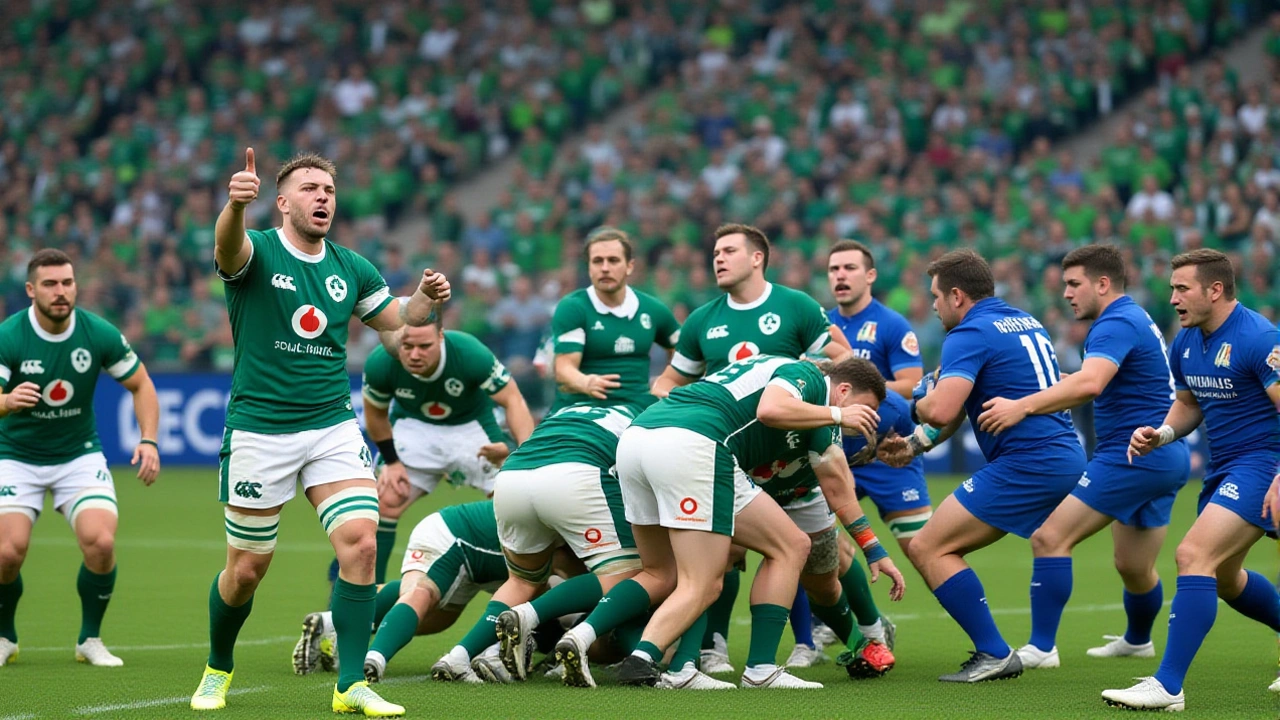23 Nov 2025
- 0 Comments
The 2026 Six Nations Championship is set to rewrite its playbook with a groundbreaking Thursday night opener between France and Ireland at Stade de France in Saint-Denis on February 5, 2026. It’s the first time in the tournament’s 143-year history that a match will kick off on a weekday evening — a bold move by Six Nations Rugby Ltd to capture prime-time global audiences. The announcement, made on May 19, 2025, didn’t just drop fixtures — it dropped a bombshell on tradition.
A New Rhythm for the Five Nations
For decades, the Six Nations ran like clockwork: Saturday afternoons, rain or shine, with two rest weeks built into the schedule. But this year, the rhythm changed. The 2026 edition will compress 15 matches into just 38 days — five weeks total — with only one rest week, following Round 3. Gone are the dual mid-tournament breaks that once gave players breathing room and fans a chance to catch their breath. Instead, the tournament now mirrors the pace of modern sports calendars, where momentum matters more than downtime.The shift isn’t arbitrary. Broadcasters, especially Sky Sports and BBC Sport, have been pushing for more prime-time slots. And now they’ve got them. Thursday’s 20:10 GMT kickoff in Saint-Denis isn’t just a novelty — it’s a test. If ratings surge, expect more evening games in future editions. The next surprise? A Friday night fixture on March 6, 2026, when Ireland hosts Wales at Aviva Stadium in Dublin.
The Full Calendar: When and Where It All Happens
Here’s the breakdown of the 2026 schedule — no fluff, just dates, venues, and kickoffs:- Round 1 (Feb 5–7): France vs Ireland (Thurs, Stade de France, 20:10 GMT); Italy vs Scotland (Sat, Stadio Olimpico, 14:10 GMT); England vs Wales (Sat, Twickenham, 16:40 GMT)
- Round 2 (Feb 14–15): Ireland vs Italy (Sat, Aviva Stadium, 14:10 GMT); Scotland vs England (Sat, Murrayfield, 16:40 GMT); Wales vs France (Sun, Principality Stadium, 15:10 GMT)
- Round 3 (Feb 21–22): France vs Scotland (Sat, Stade de France, 14:10 GMT); England vs Ireland (Sat, Twickenham, 16:40 GMT); Italy vs Wales (Sun, Stadio Olimpico, 15:10 GMT)
- Round 4 (Mar 6–7): Ireland vs Wales (Fri, Aviva Stadium, 20:10 GMT); Scotland vs France (Sat, Murrayfield, 14:10 GMT); Italy vs England (Sat, Stadio Olimpico, 16:40 CET)
- Round 5 (Mar 14): Wales vs Ireland (14:10 GMT, Principality Stadium); France vs England (16:40 GMT, Stade de France); Scotland vs Italy (20:10 GMT, Murrayfield)
Notice anything? The final day isn’t just a grand finale — it’s a three-match crescendo, with Murrayfield closing the show under the lights. That’s deliberate. The organizers want the final weekend to feel like a festival, not a footnote.

Why This Matters Beyond the Pitch
This isn’t just about TV ratings. It’s about survival. Rugby’s global audience is growing — especially in North America and Asia — but traditional Saturday slots are no longer enough to capture them. The Six Nations Championship has been the last bastion of rugby’s old-world charm. Now, it’s adapting. The condensed schedule means players will face tighter turnaround times, which could lead to more injuries. Coaches are already bracing for it. “We’re talking about 11 days between games in some cases,” said one unnamed Welsh selector in a private briefing. “This isn’t just scheduling. It’s a physical gamble.”Meanwhile, fans are thrilled. Ticket sales for the Thursday opener at Stade de France are already surging, with over 20,000 requests logged within 48 hours of the announcement. Travel agencies in Dublin, Cardiff, and Edinburgh report a spike in inquiries for March 2026. This isn’t just a rugby tournament anymore — it’s a continental event.
The Bigger Picture: Tradition Meets Commerce
The Six Nations Championship began in 1883 as the Home Nations Championship. France joined in 1910, Italy in 2000. For over a century, it resisted change — no playoffs, no bonus points, no Friday nights. But now, the commercial pressures are too strong. Guinness, the title sponsor since 2019, has invested heavily in global marketing campaigns. The 2026 schedule is their payoff.And yet, the organizers haven’t abandoned the soul of the tournament. Most matches still kick off on Saturday afternoons. The haka, the anthems, the muddy pitches — they’re all still there. This isn’t a revolution. It’s an evolution. A careful balance between heritage and hunger.

What’s Next?
Ticketing details for the 2026 tournament are expected to be released in late August 2025. Broadcast rights for international markets are still being negotiated, but early signs point to a record-breaking global deal. National unions are already planning training camps and player load management strategies. And if the Thursday night experiment works? Don’t be surprised if 2027 features a Sunday night opener.Frequently Asked Questions
Why is the 2026 Six Nations schedule so condensed?
The condensed format — five weeks instead of six — was introduced by Six Nations Rugby Ltd to accommodate expanded global broadcasting windows and reduce scheduling conflicts with club rugby. With only one rest week after Round 3, the tournament fits better into modern TV calendars, allowing for more prime-time slots like the historic Thursday and Friday night matches. This also aligns with player welfare concerns, as longer breaks can disrupt match rhythm.
Will the new schedule affect player injury rates?
Yes, experts warn that the tighter turnaround — some teams will play every 11 days — increases physical strain. In 2025, the average number of match-day injuries rose 14% compared to 2023, and coaches are now lobbying for more medical staff and recovery protocols. The French and Irish teams have already hired additional sports scientists to prepare for the 2026 grind.
How does this impact fan travel and attendance?
Fan travel is expected to surge, especially for the Thursday and Friday night games, which are more accessible to international visitors. With matches spread over fewer weeks, fans can plan longer trips — for example, attending both the Ireland vs Wales match in Dublin and the France vs England finale in Paris within a single weekend. Hotels near Stade de France and Aviva Stadium are already reporting record 2026 booking inquiries.
Is this the end of Saturday afternoon rugby?
Absolutely not. Ten of the 15 matches in 2026 still kick off on Saturday afternoons, preserving the traditional feel. The new evening slots are strategic additions, not replacements. Organizers insist the soul of the Six Nations — the atmosphere, the rivalries, the local pride — remains intact. The change is about reach, not replacement.
What role does Guinness play in this scheduling change?
As title sponsor since 2019, Guinness has pushed for greater global exposure, especially in North America and Asia, where weekend daytime viewing is less viable. Their marketing budget for 2026 is projected to exceed £40 million, with campaigns timed around the new prime-time fixtures. The Thursday night opener in France is being promoted as a global event, not just a rugby match.
Could future Six Nations tournaments have more weekday matches?
If the 2026 Thursday and Friday night games draw strong ratings — especially in the U.S. and Asia — expect more. Talks are already underway to test a Sunday night match in 2027. The goal isn’t to replace Saturday, but to extend the tournament’s footprint. This is the first step in turning the Six Nations into a truly global rugby spectacle.
